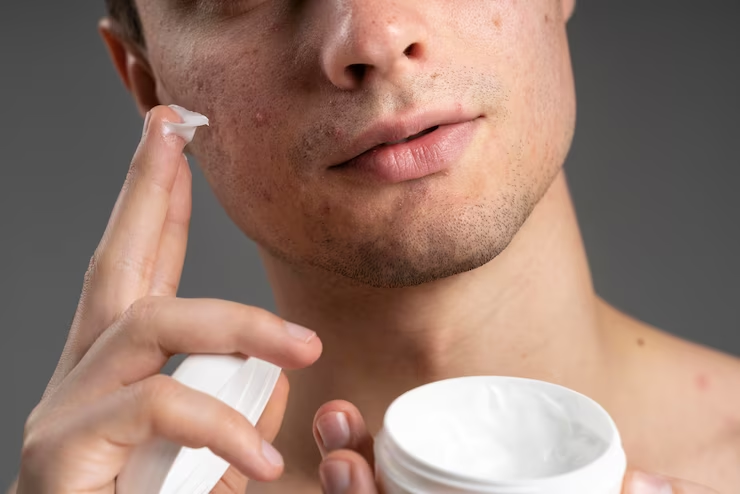
Acne is a problem that many people struggle with, and it can be incredibly frustrating to try to find solutions. While there are hundreds of types of acne, they all have one thing in common: they're caused by a buildup of sebum or oil. Considering plenty of products out there claiming to help with acne, these products often use harsh chemicals that can dry out your skin and make your acne worse.
Vitamin C is one nutrient used for decades as an antioxidant that helps prevent cell damage by neutralizing free radicals. But vitamin C is also an essential nutrient for human growth and development and plays an important role in skin health. So what does it mean? Does vitamin C help acne and clear up your complexion?
This article will take you through vitamin C and acne research and give tips on incorporating this powerful antioxidant into your skincare routine. We'll also talk about some of the best ways to use it. So let's get started!
Understanding Acne
What is Acne?
Acne is a skin condition that causes pimples and blackheads. It's caused by clogging hair follicles, which are small openings in the skin that allow hair to grow. When the pores get clogged, they become infected with bacteria, which causes inflammation and pus to form.
Acne usually starts around puberty and stops when you're in your 20s or 30s. But it can also affect people with other health conditions like diabetes or thyroid problems.
Common Causes of Acne
Many things can cause acne, including:
Not washing your face enough or using harsh cleansers
. If you're not washing your face daily, it could be clogged up with dirt and oil, leading to pimples. You should also use gentle cleansers that won't irritate the skin.Hormones
. An imbalance of hormones, like from puberty or high-stress levels, can lead to acne.Stress
. Stress can cause a lot of physical problems, including acne breakouts. It's important to keep stress under control so that it doesn't affect your body negatively in other ways.Touching your face often
. This is one of the easiest ways to spread bacteria around—and if you touch your face during the day or even at night while sleeping without washing your hands first (which we all know is super easy to forget), then you could end up causing yourself some serious irritation.Shaving often
. Having causes nicks and cuts on your skin, which can lead straight into an inflamed pore that turns into a zit.
Types of acne: inflammatory and non-inflammatory

Image credits to: Acne.org
Inflammatory acne is usually caused by an overproduction of sebum, which clogs the pores and creates bacteria that causes inflammation. It tends to be more painful and red than non-inflammatory acne, which is referred to as blackheads or whiteheads.
Non-inflammatory acne is usually just blackheads and whiteheads, but it can also be caused by oil buildup or excess dead skin cells.
Factors influencing acne development
It is important to understand the factors that contribute to the development of acne so we can work towards decreasing the risk of developing it in the first place or at least minimize its effects.
One factor that influences acne development is genetics. Scientists have found that people who have parents with acne tend to develop more severe cases of it themselves. This could be because they inherit genes from their parents, making them more susceptible to developing pimples under certain conditions.
Another factor that influences the development of acne is hormones. When levels of certain hormones change, such as during puberty or pregnancy, some people experience more frequent breakouts than usual due to changes in production of oil/sebum and skin cell growth rate.
People who are overweight are also at a higher risk for developing acne because excess fat produces more sebum (oil), which clogs pores and leads them to become inflamed and infected by bacteria living on skin surfaces where they shouldn't be found in large numbers in healthy individuals.
The Role of Vitamin C in Skin Health

You might be thinking, "Does vitamin c help acne?" The truth is that Vitamin C has been shown to reduce inflammation and redness in the skin, which can help keep breakouts at bay.
Importance of Vitamin C for Overall Well-being
Vitamin C is an essential nutrient that helps your body maintain a healthy immune system, synthesize collagen, and form blood vessels. It is found in fruits and vegetables, but its levels are highest in citrus fruits such as oranges and lemons.
It also helps make collagen, an important protein to build strong connective tissue like skin, ligaments, and tendons. In addition, it helps produce carnitine, which is needed to convert fat into energy. Vitamin C also works as an antioxidant by fighting free radicals that cause damage to cells.
Vitamin C deficiency can lead to several health issues, including scurvy (a condition characterized by bleeding gums), easy bruising or bleeding under the skin (petechiae), poor wound healing ability, the slow growth rate in children, eye problems like night blindness or dry eyes due to lack of tear production (keratoconjunctivitis sicca).
The relationship between Vitamin C and Collagen Production
The relationship between Vitamin C and collagen production is a complex one. The body's natural collagen production decreases as we age, leading to the development of wrinkles and sagging skin—a problem that can be addressed with regular application of Vitamin C-based products.
When applied topically, Vitamin C increases collagen production by stimulating fibroblasts—the cells that produce collagen—and even encourages these cells to increase their reproduction rate.
Potential Benefits of Vitamin C to Help Acne-Prone Skin
When you're dealing with acne-prone skin, it can be tempting to try anything and everything to get rid of the breakouts. But, does vitamin c help acne?
The answer is: maybe! Vitamin C is an antioxidant that can help reduce the appearance of acne scars and visible signs of aging. It also helps to lighten dark spots on your skin and improve the texture of your skin.
But here's the thing: because it has so many uses, vitamin C is often added to skincare products—and it's especially popular for acne treatment. According to a study, Vitamin C has a potential anti-inflammatory activity, which makes it especially useful for treating conditions like acne vulgaris and rosacea. It’s also shown to be effective in preventing post-inflammatory hyperpigmentation and promoting wound healing.
Vitamin C primarily has a role in combating post-inflammatory hyperpigmentation and post-acne scars than treating acne itself directly, however, it can help reduce the swelling (inflammation) and redness (erythema) associated with acne.
Incorporating Vitamin C into Skincare Routine
Different forms of Vitamin C in skincare products
Several forms of Vitamin C are commonly used in skin care products: ascorbic acid, sodium ascorbic phosphate, ascorbic palmitate, retinyl ascorbate, tetrahexyldecyl ascorbate, and magnesium ascorbic phosphate.
Sodium ascorbyl phosphate
is a form of Vitamin C shown to prevent and treat acne. It's also a good option for sensitive skin since it's non-irritating and won't cause redness or tightness as other types of Vitamin C can. You can find sodium ascorbic phosphate in serums and creams that are designed to help reduce wrinkles and fine lines around your eyes.
2.
Ascorbic palmitate
is a form of Vitamin C used in skincare products to reduce the levels of melanin in the facial skin and erythema (redness). It is an oil-soluble form of Vitamin C that reduces free radicals in your skin. It also helps brighten your skin tone and even discoloration caused by sun exposure or acne scars. 3.Retinyl ascorbate
is a derivative of vitamin C (ascorbic acid) and vitamin A (retinoic acid). It's used in skincare products to treat damage to the skin resulting from UV-induced production of free radicals, which can lead to wrinkles and other signs of aging. 4.Tetrahexyldecyl ascorbate
is a form of vitamin C that has been shown to have improved stability and ability to penetrate the epidermis, meaning it can get into your skin more easily. It also improves ascorbic acid delivery, which means it will help make sure you're getting the amount of Vitamin C in your skincare products that they claim. 5.Magnesium ascorbic phosphate
is a stabilized version of ascorbic acid with an additional molecule, which makes it more stable and less likely to degrade when exposed to light or air. It has a high affinity for melanin, which makes it ideal for treating melasma, a condition characterized by dark spots and discoloration on the skin. 6.Sodium ascorbyl phosphate
is a form of Vitamin C shown to prevent and treat acne. It's also a good option for sensitive skin since it's non-irritating and won't cause redness or tightness as other types of Vitamin C can. You can find sodium ascorbic phosphate in serums and creams that are designed to help reduce wrinkles and fine lines around your eyes.Tips for Choosing the Right Vitamin C To Help with Acne
The right vitamin C product for acne-prone skin depends on your skin type and the severity of your acne. So when you finally find a product that doesn't irritate, it's important to ensure it's helping your skin and not just sitting on top of it.
Sensitive Skin
The higher the concentration, the more likely it will irritate. Stick to serums with lower concentrations, like those with less than 15%, and always look for a trusted source and reviews from other customers with sensitive skin.
Oily Skin
If you have oily skin, opt for serums labeled "non-comedogenic" to keep excess oil from clogging pores and causing breakouts. Also, try to find a serum with L-ascorbic acid—the most potent vitamin C and can help even skin tone and increase collagen production.
Dry skin
Look for serums with hydrating ingredients like glycerin, hyaluronic acid, and Centella Asiatica. These ingredients can help your skin retain moisture, preventing dryness and reducing your risk of developing wrinkles as you age.
How to Incorporate Vitamin C Into Your Skincare Routine

STEP 1: Cleanse
Start by cleansing your face with your favorite cleanser. If you have acne-prone skin, it's best to use a product that is oil-free and non-comedogenic. If your skin is sensitive, try using an exfoliating cleanser once or twice a week to help remove dead skin cells and improve circulation.
STEP 2: Apply Toner
After cleansing, apply toner to your face with a cotton ball or pad. Toners can remove products left behind from the previous step and prep the skin for additional skincare products. Toners are also great for reducing redness and adding hydration to the skin after cleansing.
STEP 3: Apply Vitamin C Serum
Now we're ready for vitamin C! Apply your vitamin C serum directly onto clean skin and let it sit for 30 seconds before applying moisturizer on top of it. This will allow the vitamin C serum to absorb and maximize its effectiveness in your skin.
STEP 4. Moisturize
Moisturize with a lightweight moisturizer that doesn't clog pores or cause breakouts. If you have oily skin, try using a gel-based moisturizer; if you have dry skin, choose a cream-based formula instead.
STEP 5. SUNSCREEN
Wear sunscreen every single day! Sun damage is cumulative over time, so protecting yourself against sunburns can help prevent wrinkles later on. This will also protect against harmful UV rays that cause premature skin aging and increase skin cancer risk.
Conclusion
With so many promising benefits, it's no wonder that Vitamin C is being touted as a cure-all for acne. It can help your skin become more resilient to breakouts and reduce inflammation, both major causes of acne.
The best thing about Vitamin C? It's been shown to work in tandem with other products, like salicylic acid or benzoyl peroxide. So if you've been struggling to find a way to get rid of those pesky pimples and blackheads, try adding Vitamin C into your daily routine!
However, there are some possible side effects, like stomach upset or diarrhea. If you have questions about using Vitamin C for acne treatment, consult your doctor first.









